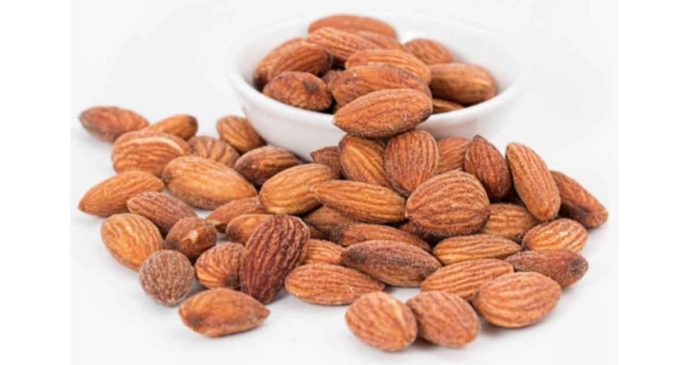Can Almonds can Lower Cholesterol? Almond trees are known for its seeds, the almond nuts that we eat. You can appreciate almonds in various delectable dishes, such as in plates of mixed greens, sweets or tidbits.
This nut likewise has numerous medical advantages: as a treatment for some skin conditions, for example, dermatitis, and as a treatment that decreases inflammation, improves gut health, and advances heart functioning. Almonds have been utilized as Ayurvedic medicine and were demonstrated to help enhance brain and sensory system health. There is likewise proof that they can lower cholesterol levels.
Though nuts are nutritious and healthy for your body, they have high calories. You should take nuts in moderation as they have high calories.
Almonds reduce the bad cholestrol levels that in turn improves your heart health.
LDL is essential in the progression of plaque that forms on the blood vessels. Eating nuts has also been associated with low risk factors associated with heart disease.
Other than being loaded with protein, most nuts contain these heart-healthy substances:
Keep Reading!
In this article:
Unsaturated fats
Omega-3 fatty acids
Fiber
Vitamin E
Plant sterols
L-Arginine
What is Cholesterol?
Almonds and Cholesterol
Other Health Benefits of Almonds
Unsaturated fats
Almonds are rich in polysaturated and monosaturated fats that are have less cholesterol. As these are considered as good fats, you have one more reason to eat nuts.
Omega-3 fatty acids
Omega-3 fatty acids are found in various fish, and various nuts also have them. Omega-3s are a type of unsaturated fats that seem to help your heart, by restoring abnormal heart rhythms that can lead to heart attacks.
Fiber
Fiber has many health benefits like reducing cholesterol levels and risk of type 2 diabetes. When you take fiber rich foods like nuts you will feel full and tend to eat less which helps you to maintain healthy weight.
Vitamin E
Taking vitamin E helps you to prevent the plaque formation in your blood vessels. Plaques in your blood vessels are responsible for causing chest pain, heart attack and coronary artery disease.
Almonds contain adequate levels of vitamin E, a cell antioxidant. All things considered, these are extraordinary sources when contrasted with different sources of vitamin E, giving 37 percent of the recommended daily allowance in only 1 ounce.
Plant sterols
Plant sterols are found in certain nuts, that can reduce your cholesterol levels. They are normally added to things like margarine for additional medicinal benefits, yet sterols are usually found in nuts.
L-Arginine
This compound that is abundantly found in nuts helps to avoid blood clotting and makes your blood vessels more flexible. As a result the blood circulation gets improved.
What is Cholesterol?
Cholesterol is a fatty substance that is known as a lipid and is basic for the normal functioning of the body. It is made by the liver, yet it can similarly be found in a few foods. Having abnormal levels of lipids in your blood (hyperlipidemia) can influence your health and wellbeing. High cholesterol levels itself don’t conventionally cause any manifestations, yet it develops risk for serious medical problems.
Cholesterol is conveyed in your blood by proteins. These proteins are called lipoproteins. The two fundamental types of lipoprotein are high density lipoproteins and low-density lipoproteins. HDL is referred to as the “good cholesterol”, and elevated levels of it are better. Low-density lipoprotein (LDL) passes on cholesterol to the cells that require it. In any case, when it is in abundance, it can develop in the blood vessels. Thus, LDL is known as “bad cholesterol”.
The amount of cholesterol in the blood – both HDL and LDL – can be evaluated with blood tests. The cholesterol levels in the blood decide if an individual is at a higher or at a lower chance for having heart and blood vessel problems.
Proof firmly shows that high cholesterol can build the risk of heart attacks, narrowing of the blood vessels (atherosclerosis), peripheral artery disease (PAD), stroke and transient ischemic attack (TIA), frequently known as a “mild stroke”. This is on the grounds that cholesterol can develop in the blood vessels, constraining the blood stream to your heart, brain and in other parts of the body. It also develops the risk of blood coagulation that will form in any area of your body.
Your danger of having heart disease furthermore increases as your blood’s cholesterol level increases. This can cause pain in your chest or arm during pressure or physical action (angina).
Various factors can extend your risk of having heart disease or a stroke if you have high cholesterol levels. These include a poor eating routine, for example, eating a lot of saturated fat, having a family history of stroke or heart disease, having diabetes or hypertension, and smoking. There’s a condition called familial hypercholesterolemia, which can cause elevated cholesterol levels even in individuals who eat healthily.
Almonds and Cholesterol
Almonds are oftentimes associated with enhanced levels of good cholesterol and are being valuable for the heart. There is some proof showing that including almonds in your diet may guard against heart disease, however, there is still little proof to demonstrate this.
Studies have shown a Mediterranean diet that comprises of nuts have tremendous therapeutic advantages.
Other Health Benefits of Almonds
Almonds could likewise lessen disease risk. Almonds consumption can likewise control glucose levels, since they contain higher amounts of magnesium. Two ounces of almonds can already satisfy the daily requirement for magnesium. In one study, 33% of people with Type 2 diabetes have low blood magnesium levels. Consuming almonds can likewise help control weight.
Found this article interesting? Share it with others and spread the word. Sign up to our newsletter and receive exclusive health tips and news straight to your inbox!




















